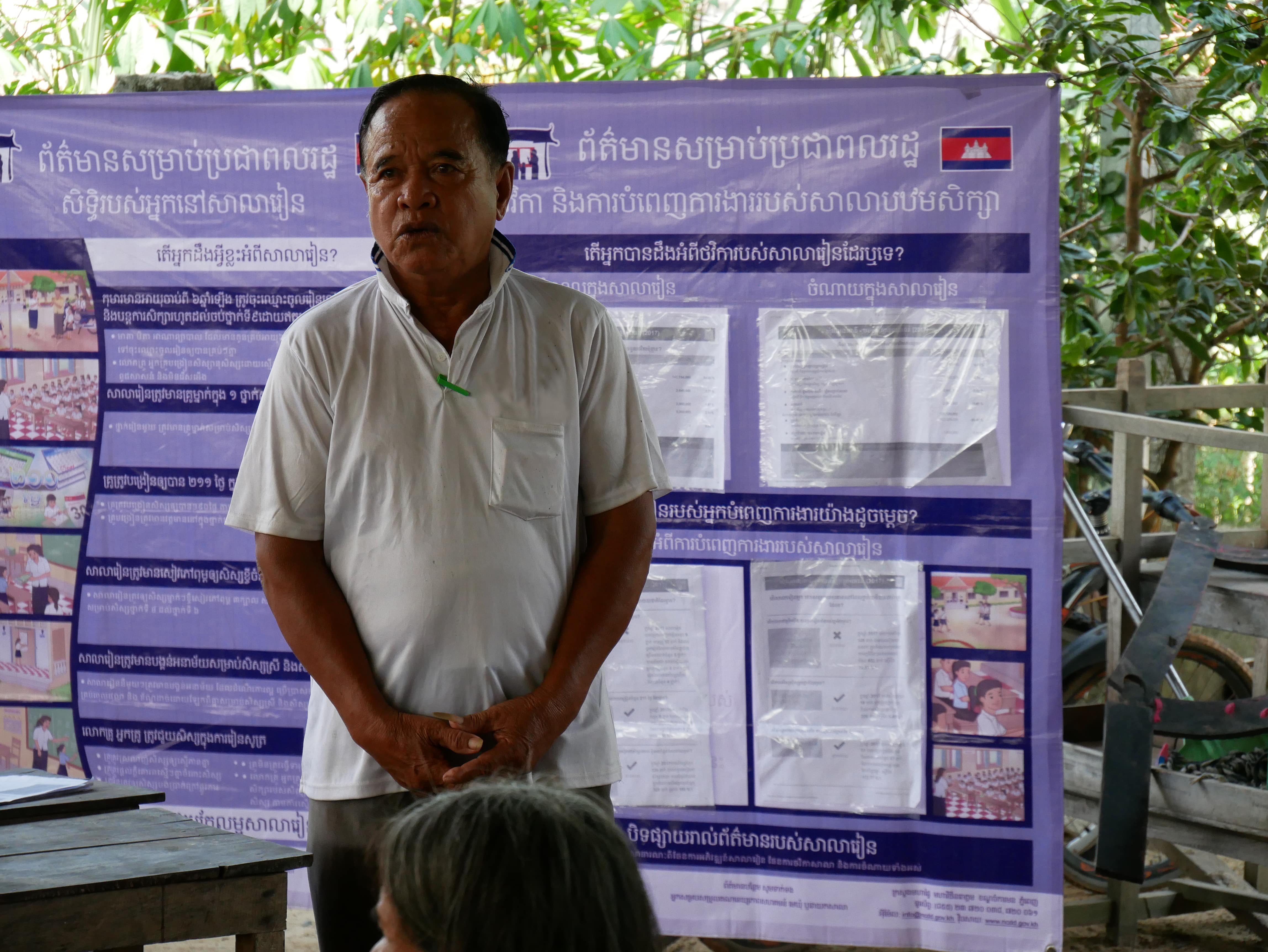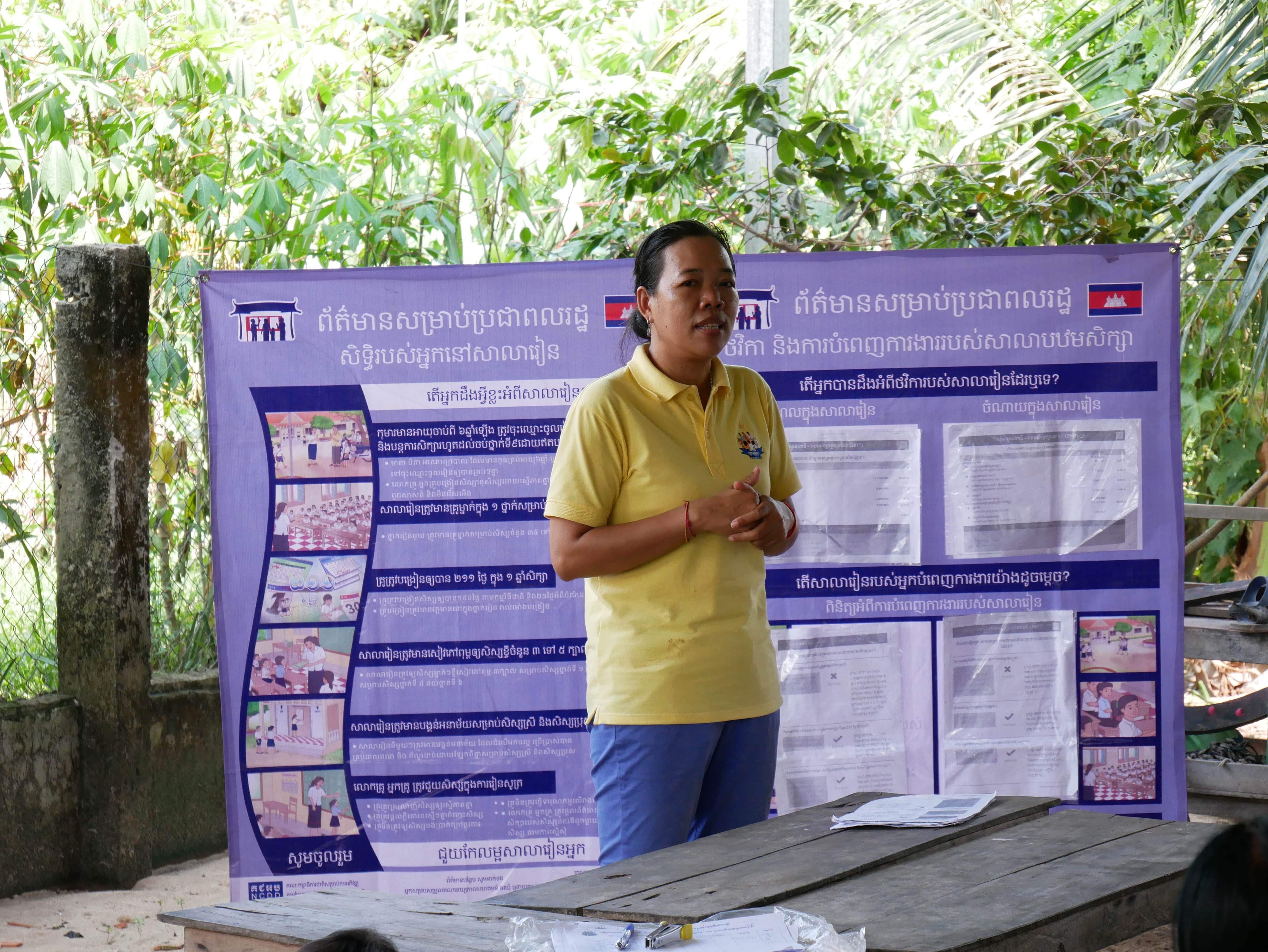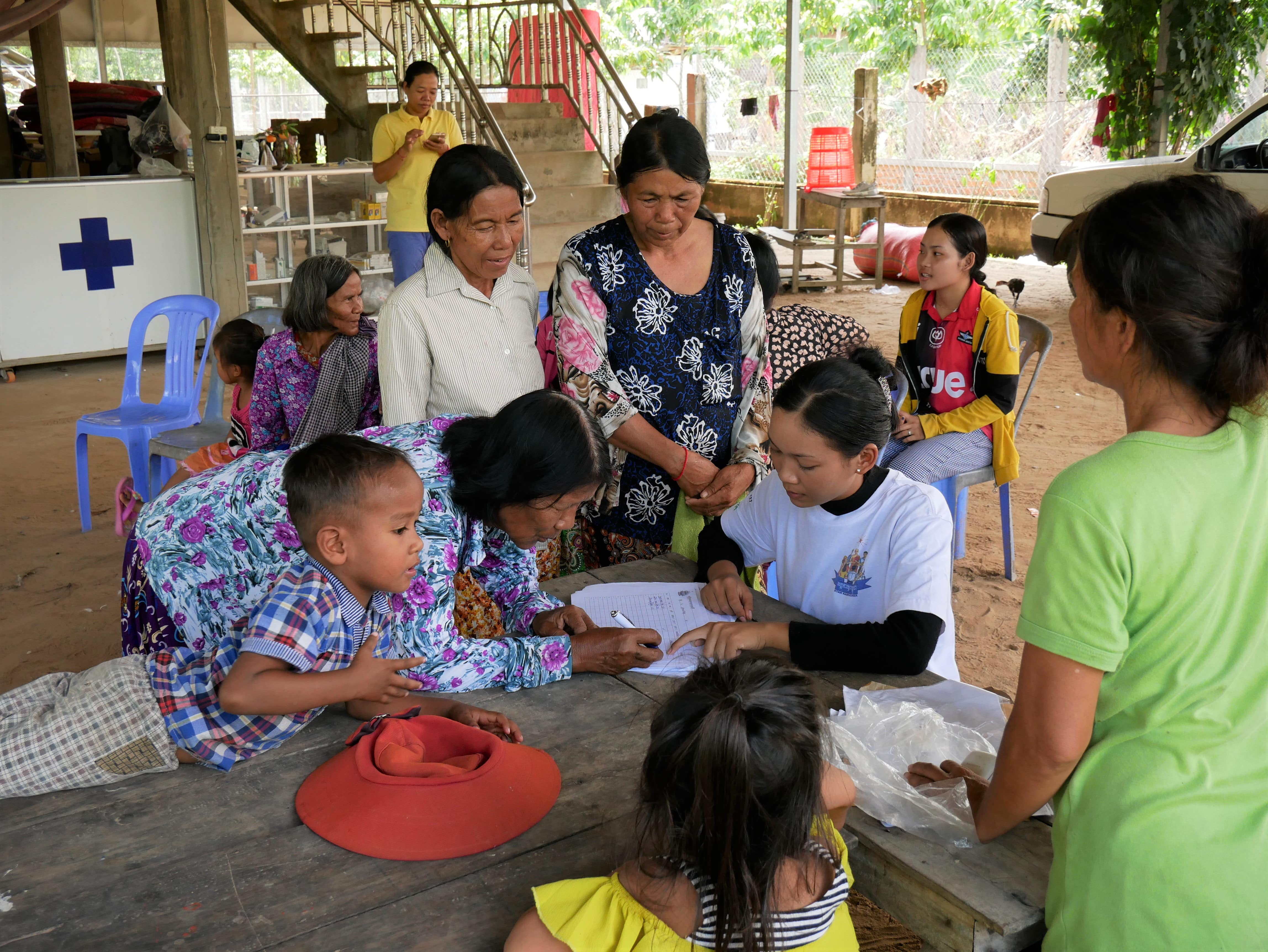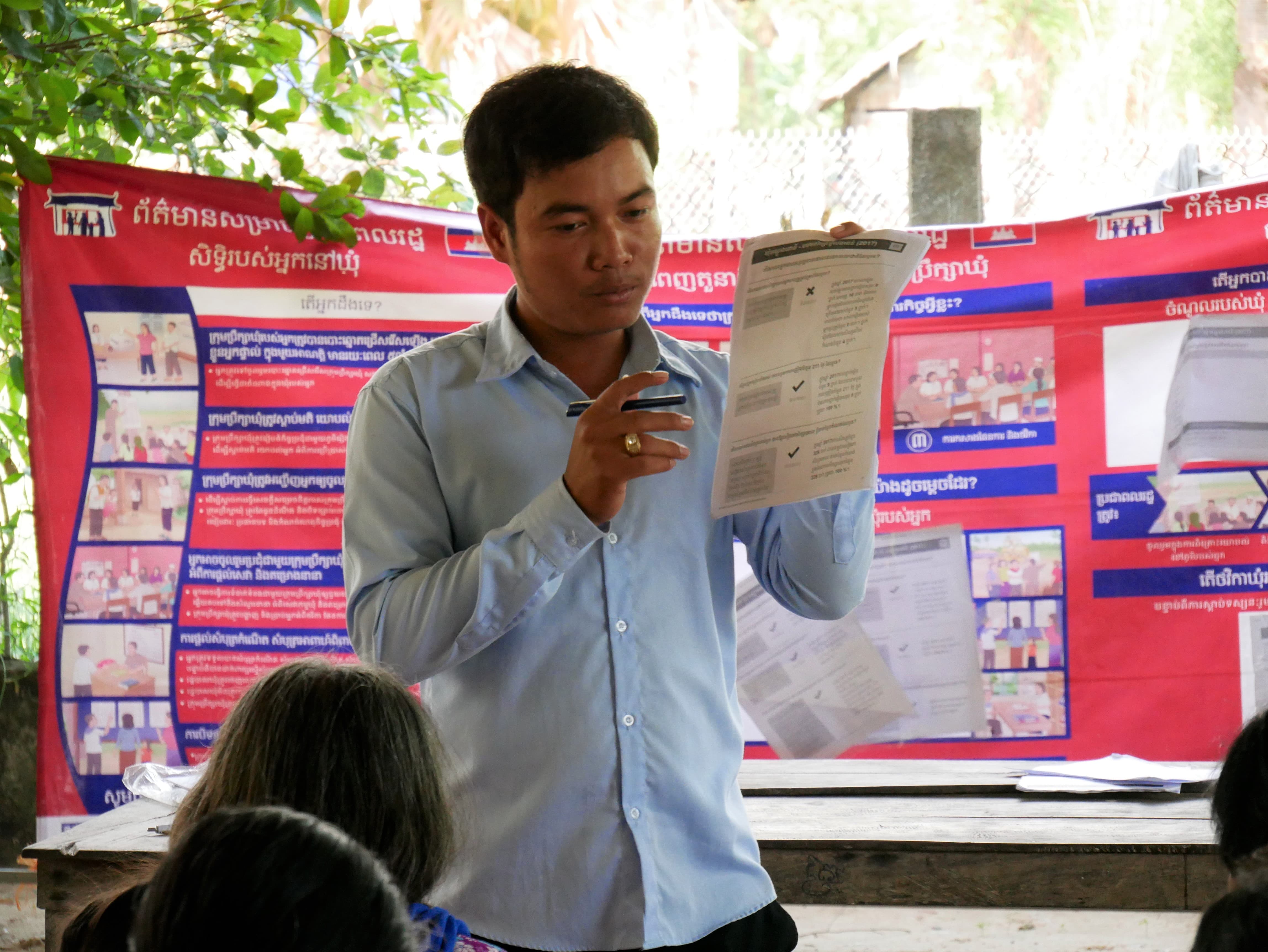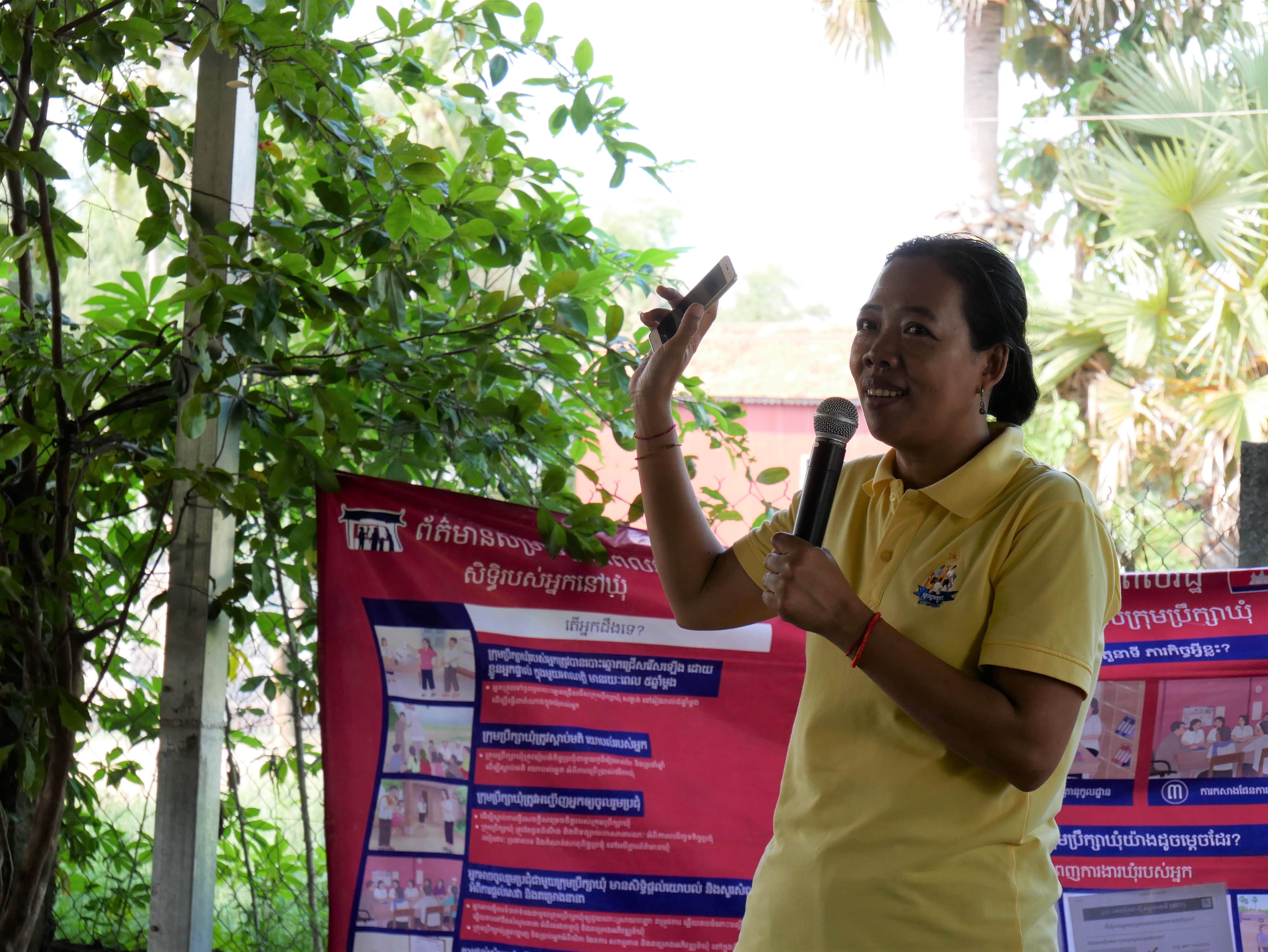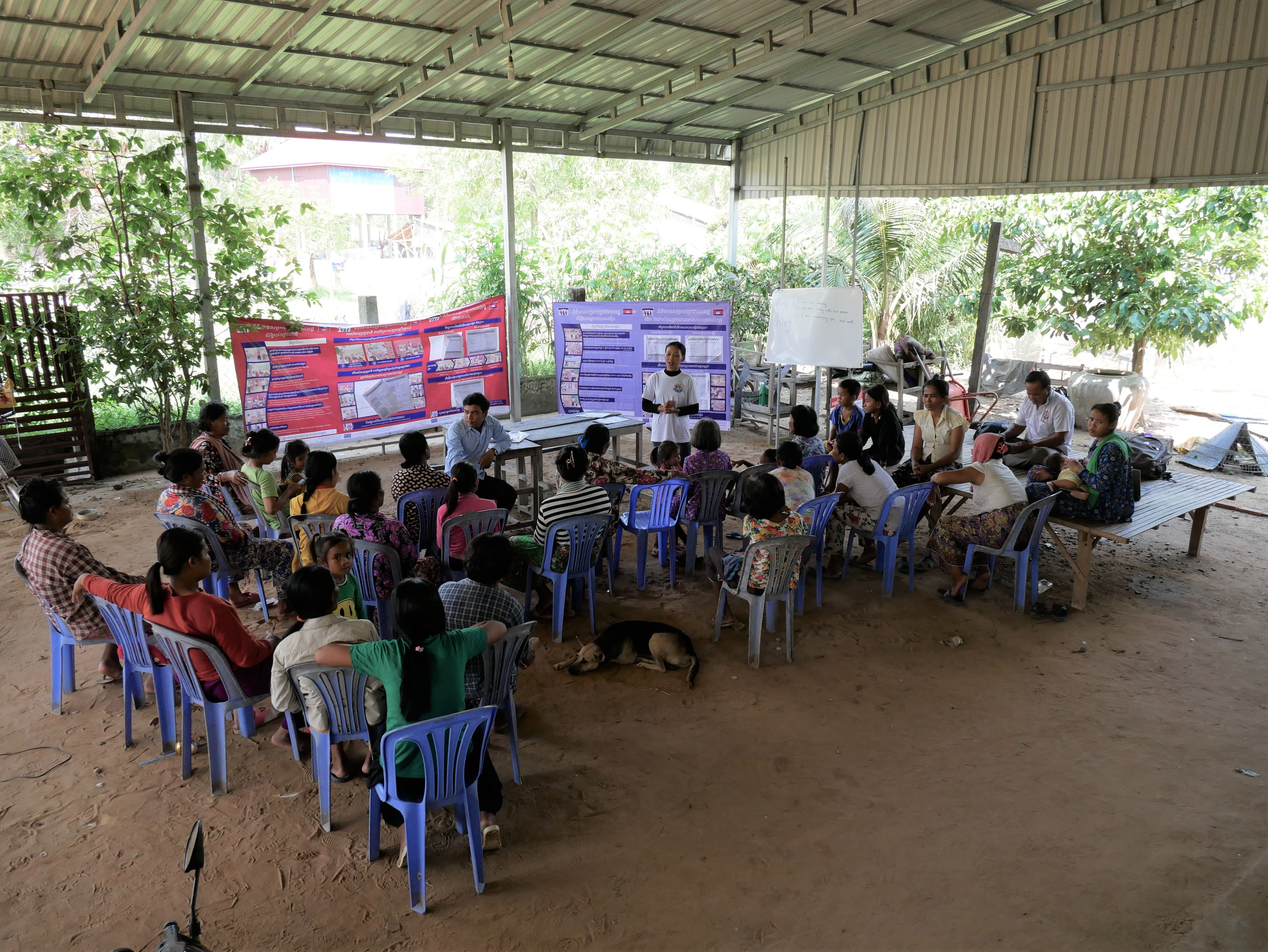អូឌីស៊ីចូលរួមការប្រជុំស្ដីពី កញ្ចប់ព័ត៌មានសម្រាប់ប្រជាពលរដ្ឋ (I4Cs) នៅក្នុងស្រុករមាសហែក ខេត្តស្វាយរៀង
ដោយមានកិច្ចសហការពីអង្គការស្ដារកម្ពុជា (SK) កាលពីចុងសប្ដាហ៍ ថ្ងៃទី១៩ ខែឧសភា ឆ្នាំ២០១៨ ក្រុមការងាររបស់អង្គការទិន្នន័យអំពីការអភិវឌ្ឍ ហៅកាត់ថា អូឌីស៊ី បានចុះទស្សនកិច្ចសកម្មភាពអនុវត្តនៅនឹងកន្លែង។ ដំណើរទស្សនកិច្ចនេះ មានគោលបំណង សិក្សាអំពីដំណើរការនៃការអនុវត្ត ការងារគណនេយ្យភាពសង្គម នៃសេវាសាធារណៈ។
កាលពីរសៀលថ្ងៃសៅរ៍ មានមនុស្សប្រមាណ ៣០នាក់ នៅភូមិចុងព្រែក ឃុំអណ្ដូងពោធិ៍ (ខេត្តស្វាយរៀង) បានមកជួបជុំគ្នា នៅកន្លែងប្រជុំមួយ ដើម្បីពិភាក្សាអំពី សកម្មភាពរបស់អ្នកសម្របសម្រួលគណនេយ្យភាពសង្គម (CAFs) ដែលជាអ្នកស្ម័គ្រចិត្តជម្រុញ ដំណើរការផ្តល់សេវាសាធារណៈប្រកបដោយចីរភាពនៅក្នុងឃុំរបស់ពួកគេ។ កិច្ចប្រជុំនេះ ដែលត្រូវបានគេស្គាល់ថា ‘I4Cs’ (មកពី «កញ្ចប់ព័ត៌មានសម្រាប់ប្រជាពលរដ្ឋ») បានរៀបចំឡើងក្រោមការជួយជ្រោមជ្រែងរបស់អង្គការស្ដារកម្ពុជា (SK)។ ព័ត៌សម្រាប់ប្រជាពលរដ្ឋគឺជាការចាប់ផ្តើមដំបូងនៃវត្តរបស់ការអនុវត្តការងារគណនេយ្យភាពសង្គម (I-SAF) ដែលមានគោលបំណងផ្សព្វផ្សាយព័ត៌មាន និងលើកកម្ពស់ការយល់ដឹងរបស់ប្រជាពលរដ្ឋ អំពីការផ្តល់សេវាសាធារណៈ ដូចជាបញ្ហាសុខភាព ការអប់រំ និងការគ្រប់គ្រងរដ្ឋបាលឃុំ ក៏ដូចជាតួនាទីរបស់សេវានីមួយៗ។
អ្នកចូលរួម ភាគច្រើនជាស្ត្រី ហើយបានស្តាប់ដោយយកចិត្តទុកដាក់ ចំពោះការបកស្រាយដោយអ្នកសម្របសម្រួលគណនេយ្យភាពសង្គមទាំង ២នាក់លើចំណុចសំខាន់ៗនៃកិច្ចប្រជុំ រយៈពេលប្រហែល ២ម៉ោងកន្លះ។ ក្នុងនាមជាអ្នកតំណាងនៃតំបន់ទាំងមូល អ្នកធ្វើបទបង្ហាញទាំងពីររូបមានសេចក្ដីសោមន្សរីករាយណាស់ ដែលមានមនុស្សជាច្រើនចាប់អារម្មណ៍ចូលរួមនៅក្នុងព្រឹត្តិការណ៍នេះ ទោះបីជាកម្មវិធីនេះត្រូវបានធ្វើឡើងជាលើកដំបូងនៅក្នុងភូមិនេះក៏ដោយ។ ហេតុផលចម្បង ដែលប្រជាពលរដ្ឋចូលរួម កិច្ចប្រជុំនេះគឺ ដើម្បីស្វែងយល់អំពីថវិកាឃុំ និងចរន្តនៃការចំណាយរបស់ថវិកានោះ និងតួនាទីរបស់អ្នកសម្របសម្រួលគណនេយ្យភាពសង្គមផងដែរ។ ជាក់ស្ដែង ការពិភាក្សាដោយបើកចំហបែបនេះ មិនដែលកើតមានឡើងនៅក្នុងភូមិនេះពីមុនឡើយ។ បញ្ហានេះភាគច្រើនកើតឡើងដោយសារតែ នីតិវិធីថវិកា មិនទាន់មានភាពងាយស្រួល សម្រាប់ឱ្យប្រជាពលរដ្ឋធ្វើការតាមដានឡើយ។ ហេតុដូច្នេះហើយបានជា គម្រោង «ការធ្វើឲ្យប្រសើរឡើងនូវការផ្តល់សេវាសាធារណៈ តាមរយៈបច្ចេកវិទ្យាគមនាគមន៍ និងព័ត៌មានវិទ្យា» ដែលទទួលបានការឧបត្ថម្ភថវិកាដោយកម្មវិធី SPIDER ត្រូវបានបង្កើតឡើងដើម្បីធ្វើឱ្យស្ថានភាពកាន់តែល្អប្រសើរ។
អ្នកចូលរួមម្នាក់បានបង្ហាញពីអារម្មណ៍សប្បាយរីករាយ ដែលបានចូលរួមក្នុងព្រឹត្តិការណ៍នេះ ព្រោះវាធ្វើឱ្យគាត់ដឹងអំពីអ្វីដែលកំពុងកើតឡើងនៅក្នុងសហគមន៍របស់គាត់។ គាត់ក៏រំពឹងថាងនឹងចូលរួមកិច្ចប្រជុំនេះម្តងទៀត ដូចដែលបានមានប្រសាសន៍ខាងក្រោម៖
«ខ្ញុំបានចូលរួមកិច្ចប្រជុំនៅថ្ងៃនេះ ពីព្រោះខ្ញុំមិនដែលដឹងពីអ្វីដែលកំពុងកើតឡើងនៅក្នុងឃុំរបស់ខ្ញុំពីមុនទេ។ កិច្ចប្រជុំនេះ បានផ្ដល់ព័ត៌មានជាច្រើន ហើយខ្ញុំបានរៀនសូត្រច្រើនពីវា។ […] អត្ថប្រយោជន៍ដំបូងគឺថា ឥឡូវនេះខ្ញុំបានដឹងថាឃុំរបស់ខ្ញុំមានថវិកាខ្លះ ហើយថវិកានោះត្រូវបានប្រើប្រាស់លើគម្រោងអ្វីខ្លះ។ កាលពីមុន ខ្ញុំមិនដែលបានដឹងអំពីតម្លៃនៃការធ្វើសំបុត្រកំណើត ជាដើម។ កិច្ចប្រជុំនេះបានធ្វើឱ្យខ្ញុំដឹងពីរឿងទាំងនេះ។ ដំណើរការនៃការទទួលបានសំបុត្រកំណើតនេះមិនមានរយៈពេលយូរទេ ហើយអាជ្ញាធរមិនត្រូវការអ្វី និងមិនតម្រូវឱ្យមានកម្រៃសេវាអ្វីនោះឡើយ។ សម្រាប់ថវិកាឃុំ ខ្ញុំមិនដែលបានដឹងថា មានថវិកាជាង ២៩០ លានរៀលនៅក្នុងឃុំរបស់ខ្ញុំឡើយ។ ហើយខ្ញុំក៏មិនដែលបានដឹងអំពីការចំណាយនោះទេ។ ប៉ុន្តែឥឡូវនេះ ខ្ញុំបានយល់ដឹងពីវាក្នុងការប្រជុំនេះ។ ជាឧទាហរណ៍ ការចំណាយលើការជុសជុលផ្លូវ ដែលរួមចំណែកដល់សហគមន៍ទាំងមូល […] គាំទ្រដល់កម្មវិធីមតេ្តយ្យសិក្សា នៅក្នុងសហគមន៍របស់ខ្ញុំ។ រឿងមួយទៀតគឺថា ថវិកាត្រូវបានប្រើប្រាស់ដើម្បីឧបត្ថម្ភដល់ស្ត្រីមានផ្ទៃពោះ និងការពិនិត្យសុខភាព។ បន្ទាប់ពីបានដឹងអំពីការគាំទ្រនេះពីថវិកាឃុំ ខ្ញុំមានអារម្មណ៍ថាសប្បាយរីករាយ។ […] ខ្ញុំសូមស្នើសុំឱ្យរៀបចំព្រឹត្តិការណ៍លើកកម្ពស់ការយល់ដឹងនេះម្តងទៀត ដើម្បីឱ្យប្រជាជននៅក្នុងភូមិរបស់ខ្ញុំ រួមទាំងខ្ញុំផងដែរ មានការយល់ដឹងបន្ថែមទៀត។ ការប្រជុំលើកដំបូងនេះ បានធ្វើអោយខ្ញុំដឹងពីសកម្មភាពទាំងនេះ។ នៅពេលប្រជុំបន្ទាប់ យើងនឹងយល់ដឹងបន្ថែមទៀតអំពីវា ហើយយើងនឹងអាចសាកសួរជាសំណួរផ្សេងៗ។ យើងមិនបានលើកសំណួរទេ នៅពេលប្រជុំនេះ ព្រោះវាជាលើកដំបូង ហើយយើងទើបតែចេះចាប់ផ្ដើមពិចារណាលើរឿងទាំងអស់នេះ។ នេះហើយជាមូលហេតុដែលយើងមិនហ៊ានសួរសំនួរ ដោយសារពួកយើងខ្លាចសួរសំណួរដែលមិនសមស្រប។»
អ្វីដែលបានលើកឡើងនេះ បង្ហាញនូវភាពប្រសើរឡើងជាទូទៅ ដែលសម្រេចបាននៅក្នុងឃុំអណ្ដូងពោធិ៍។ ដោយបានសង្កេតឃើញពីការផ្លាស់ប្តូរយ៉ាងពិតប្រាកដ អង្គការស្ដារកម្ពុជា បានចាត់តាំងអ្នកសម្របសម្រួលគណនេយ្យភាពសង្គម ជាយុវជនបង្គោលនៃការអនុវត្តគណនេយ្យភាពសង្គម នៅក្នុងភូមិនេះ។ ពួកគាត់បានបង្ហាញពីការលើកទឹកចិត្ត និងការប្តេជ្ញាចិត្តយ៉ាងមុតមាំ ដើម្បីផ្លាស់ប្តូរសហគមន៍របស់ពួកគាត់។ ជាក់ស្ដែង ស្រីឡែន ជាសិស្សថ្នាក់ទី ១២ ដែលរស់នៅក្នុងឃុំអណ្ដូងពោធិ៍ បានក្លាយជាអ្នកសម្របសម្រួលគណនេយ្យភាពសង្គម អស់រយៈពេលប្រហែល ៦ខែ មកហើយ។ នាងបានសម្តែងនូវការពេញចិត្ត ក្នុងនាមជាអ្នកសម្របសម្រួលគណនេយ្យភាពសង្គម ដោយនាងបានសង្កេតឃើញពីភាពប្រសើរឡើងនៅក្នុងឃុំរបស់នាង បន្ទាប់ពីមានការអនុវត្តគម្រោងនេះ។ នាងមានភាពស្វាហាប់ណាស់ ក្នុងការចូលរួមផ្លាស់ប្តូរ នៅពេលដែលឃើញការរីកចម្រើននៃសេវាកម្ម នៅក្នុងសហគមន៍របស់នាង៖
«ក្នុងនាមជាអ្នកសម្របសម្រួលគណនេយ្យភាពសង្គម ខ្ញុំអាចស្ម័គ្រចិត្តក្នុងការជួយឃុំរបស់ខ្ញុំ។ ជាដំបូង យើងគួរនាំយកការព្រួយបារម្ភរបស់ប្រជាពលរដ្ឋទៅកាន់អាជ្ញាធរមូលដ្ឋាន ដូច្នេះពួកគាត់អាចធ្វើការជាមួយគ្នា ដើម្បីស្វែងរកដំណោះស្រាយ នៅក្នុងពេលវេលាដ៏សមស្របណាមួយ។ ក្រៅពីនេះ ក្នុងនាមជាអ្នកសម្របសម្រួលគណនេយ្យភាពសង្គម ខ្ញុំទទួលបានបទពិសោធន៍ថ្មីៗជាច្រើន។ […] ទោះបីជាខ្ញុំមិនមែនជាអ្នកមានបទពិសោធន៍ច្រើនយ៉ាងណាក៏ដោយ អ្វីដែលខ្ញុំសង្កេតឃើញថាមានការប្រែប្រួលខ្លាំងគឺ ឥរិយាបថរបស់ប្រជាពលរដ្ឋ ដែលបានយល់ដឹងអំពីសិទ្ធិរបស់ពួកគាត់ និងព័ត៌មានអំពីសេវាកម្មដែលពួកគាត់កំពុងប្រើប្រាស់។ ទាក់ទងទៅនឹងភាពប្រសើរឡើងរបស់អ្នកផ្តល់សេវាវិញ វាមិនមែនមានន័យថាអ្នកផ្តល់សេវាទាំងនោះមិនបានដើរតួនាទីរបស់ពួកគាត់បានល្អ នៅមុនពេលដែលអង្គការស្ដារកម្ពុជាបានចាប់ផ្តើមអនុវត្តគម្រោងនេះទេ។ ទោះជាយ៉ាងណាក៏ដោយ អ្វីដែលសំខាន់បំផុតនោះគឺ អ្នកផ្តល់សេវាកម្មទាំងអស់នោះកាន់តែមានទំនុកចិត្ត ក្នុងការផ្តល់សេវាកម្ម។ ពួកគាត់បានកសាងទំនាក់ទំនងល្អជាមួយប្រជាពលរដ្ឋកាន់តែប្រសើរឡើង បន្ទាប់ពីគម្រោងនេះបានចាប់ផ្តើមអនុវត្តកន្លងមក។»
បន្ទាប់ពីកិច្ចប្រជុំលើកកម្ពស់ការយល់ដឹងនេះបានធ្វើឡើងនៅក្នុងភូមិដទៃទៀតរួច អ្នកសម្របសម្រួលគណនេយ្យភាពសង្គមនឹងបន្តធ្វើការងាររបស់ពួកគាត់ និងបន្តរៀបចំសកម្មភាពមួយចំនួនផ្សេងទៀតដូចជា ការត្រួតពិនិត្យរបស់ប្រជាពលរដ្ឋ (Citizen Monitoring) ជាមួយនឹងប័ណ្ណដាក់ពិន្ទុដោយសហគមន៍ កិច្ចប្រជុំរួមជាមួយសហគមន៍ ជាដើម។
មិនគ្រាន់តែជាអ្នកសម្របសម្រួលនៃគម្រោង និងផ្តល់ការបណ្តុះបណ្តាលដល់អ្នកសារព័ត៌មានប្រជាពលរដ្ឋ អ្នកសារព័ត៌មាននិស្សិត និងអ្នកសារព័ត៌មានធម្មតានោះទេ ក្រុមការងារអូឌីស៊ី ក៏ផ្តល់នូវវគ្គបណ្តុះបណ្តាលខ្លះៗដល់អ្នកសម្របសម្រួលគណនេយ្យភាពសង្គម អំពីប្រធានបទជាក់លាក់ផងដែរ ជាឧទាហរណ៍ ប្រធានបទស្ដីពី ការទទួលបានព័ត៌មានសេវាសាធារណៈ នៅលើគេហទំព័រអូឌីស៊ី ដែលមានសារៈប្រយោជន៍ និងផ្តល់ព័ត៌មានជាច្រើនដល់ពួកគាត់។
ដំណើរទស្សនកិច្ចដើម្បីពិនិត្យមើលការអនុវត្ដនៃការផ្តល់សេវាសាធារណៈនៅនឹងកន្លែង គឺមានសារៈសំខាន់ណាស់ នៅពេលក្រុមការងាររបស់អង្គការទិន្នន័យអំពីការអភិវឌ្ឍមានឱកាស ដើម្បីជួបសន្ទនាផ្ទាល់មាត់ជាមួយនឹងប្រជាពលរដ្ឋ និងអ្នកសម្របសម្រួលគណនេយ្យភាពសង្គម ដែលត្រូវបានចូលរួម និងជាផ្នែកមួយនៃការអនុវត្ត I-SAF។ អូឌីស៊ីនឹងបន្តដំណើរទស្សនកិច្ចមួយផ្សេងទៀត សម្រាប់ព្រឹត្តិការណ៍ I-SAF ផ្សេងទៀតនៅពេលក្រោយទៀត។

